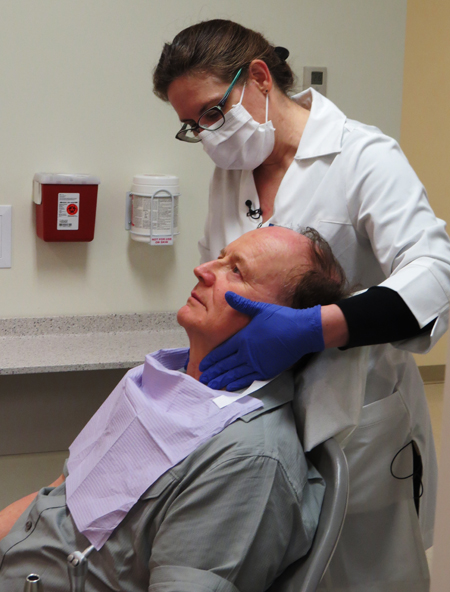
Associate clinical dental hygiene professor Alexandra Sheppard completes an extra and intra oral exam on dental patient Robert Gilmour. After a dental hygiene student discovered a carotid body tumour on Gilmour, he returns to the clinic annually for a check-up.
What was supposed to be a routine dental visit for Robert Gilmour quickly turned into a health scare after a common extra-and intra-oral cancer dental hygiene exam revealed a lump in this neck.
The exam, completed by a dental hygiene student at the School of Dentistry, is typically done to assess all patients before beginning any cleanings or treatments. Finding an enlargement, the student and instructor recommended that Gilmour see his doctor first. The ultrasound showed he had a carotid body tumour.
"It was my first visit to the School's clinic," says the 69-year-old. He had just retired and no longer qualified for dental coverage. So, coming to the dental clinic was a blessing in disguise. "From the dentist's office I ended up on a surgeon's operating table within three weeks."
While the tumour was found not to be cancerous, had it gone undetected, it could have had severe health risks to Gilmour.
"Even the surgeon couldn't believe that a student found the lump. He said it may have been a life-saving diagnosis for me. Neck exams should be mandatory and done by every dentist or dental hygienist. They are important, even if they are just catching enlarged thyroids," says Gilmour. "I come every year now for a routine check-up."
Associate clinical dental hygiene professor Alexandra Sheppard says that completing the extra-and intra-oral exam is mandatory training for students. Since she's been with the School at least three patients have needed further follow-up and surgery by their family practitioner.
"Patients should be requesting this exam be done," says Sheppard. "We encourage our students to continue doing these exams after they graduate and start practicing."
While a cancerous lump is the most serious, any abnormalities or deviations should be immediately checked as well.
"The majority of lumps will disappear in a few weeks, if they are non-life threatening," says Sheppard, adding oral health and overall health go hand-in-hand.
Gilmour's tumour was discovered and surgically removed in 2005. Since then he has had no health complications.